|
|
|
Sort Order |
|
|
|
Items / Page
|
|
|
|
|
|
|
| Srl | Item |
| 1 |
ID:
108542
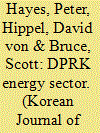

|
|
|
|
|
| Publication |
2011.
|
| Summary/Abstract |
This report discusses the history, current status, and potential future of the DPRK
energy sector. The authors, drawing on the Nautilus Institute's decades of work
on North Korea, describes the history of the DPRK energy sector, in particular
changes in the sector since 1990. The study then looks at the current status and
supply and demand balance of North Korea's energy sector noting the vulnerabilities and critical needs of that sector. The report also explores options for the
rehabilitation of the DPRK energy sector that could be used in negotiations with
North Korea as part of a "roadmap" to denuclearization and legitimate energy
needs if negotiations are not successful and the DPRK either collapses (due to an
internal coup, succession crisis, or war) or continues to stagnate. The report concludes by identifying the robust strategies that are important in both engagement
and non-engagement (collapse or stagnation) scenarios.
|
|
|
|
|
|
|
|
|
|
|
|
|
|
|
|
| 2 |
ID:
108544
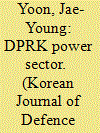

|
|
|
|
|
| Publication |
2011.
|
| Summary/Abstract |
This report provides an overview of the present status of the DPRK power sector
that includes newly analyzed data and future prospects of electricity supply and
demand in North Korea as well as establishes several basic inter-Korean energy
cooperation plans. South Korean policies to improve this difficult situation should
be implemented to overcome the DPRK electricity shortage. However, because of
the strong political backlash caused by the North Korean attacks on the Cheonan
corvette and Yeonpyeong Island in 2010, all cooperation, including energy cooperation between the two Koreas, has stopped. Nevertheless, a basic plan to solve
the DPRK energy crisis should be continuously discussed and established by the
ROK, considering the total potential costs of reunification and the peace and stability of the Korean peninsula. Therefore this report also considers possible
changes in inter-Korean relations as a result of electric power system interactions
and is intended to be a starting point for the establishment of necessary plans for
the interconnection of the power systems of the two Koreas and the fulfillment of
longstanding grand plans for a Unified Korean Power System (UKPS).
|
|
|
|
|
|
|
|
|
|
|
|
|
|
|
|
| 3 |
ID:
108540
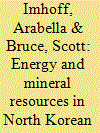

|
|
|
|
|
| Publication |
2011.
|
| Summary/Abstract |
Addressing the DPRK nuclear weapons issue requires that the DPRK rebuild its
economy in peaceful ways that avoid illicit or sanctioned activities. Two major
components of this economic transformation are the state's mineral sector and
energy sector, which must have the infrastructure to support economic growth.
Accurately assessing the DPRK energy and mineral sectors is challenging, given
the significant amount of inaccurate data on the subject. However, unless such
policy-relevant data and analysis can be generated, it is impossible for decisionmakers to determine how to engage the DPRK in a meaningful way. From a
DPRK perspective, such analysis is equally critical because it is evident that substantial rehabilitation of the energy sector and development of the mineral sector
is impossible without external assistance. The following papers contained in this
special edition of the KJDA outline the status of the energy and mineral sectors
and paint a bleak picture of North Korea: a decaying energy infrastructure, mines
lacking adequate supplies and fuel, and a crippled energy sector unable to support
commercial development that now functions at a fraction of its output 20 years
ago. However, three options for engaging the DPRK are available: 1) Cooperative
energy efficiency projects in the DPRK. 2) Working with the DPRK to ensure
that the pilot light water reactor at Yongbyon complies with proper design and
construction standards. 3) Assisting the DPRK with minerals-sector development,
including providing markets for the minerals produced.
|
|
|
|
|
|
|
|
|
|
|
|
|
|
|
|
| 4 |
ID:
108548


|
|
|
|
|
| Publication |
2011.
|
| Summary/Abstract |
North Korean mineral resources are substantial and some of these minerals (such
as magnesite, zinc, iron, and tungsten) could create highly competitive markets.
However, almost all of North Korean mines suffer from a lack of electric power
and alternatives must be sought in order to solve the country's electricity shortage.
To improve mine productivity the construction of large-scale hydro plants, the
remodeling of the overall power system and a cooperative policy with Russia and
South Korea are recommended. Foreign investors (including several South Korean
companies) are eager to participate in North Korean mining projects. However, it
has been difficult for investors to participate in these projects, as most want to
establish their own companies and operate the mines themselves. In this respect,
North Korea's weak points are its legal restrictions and poor infrastructure. Therefore, it is important that North Korea creates favorable conditions for investment
and upholds its contracts with foreign companies. It is hoped that North Korea and
South Korea will normalize relations in the near future and mining projects can be
restarted. Inter-Korean mining cooperation has the potential to be beneficial for
both sides, as North Korea could increase mining production and stimulate its
economy and South Korea could in turn secure nearby mineral commodities.
|
|
|
|
|
|
|
|
|
|
|
|
|
|
|
|
| 5 |
ID:
108552
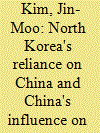

|
|
|
|
|
| Publication |
2011.
|
| Summary/Abstract |
North Korea's economic reliance on China has been increasing recently. China is
certainly North Korea's most important partner of political collaboration and
international mediator. The international community is paying close attention to
the possibility that China may bring North Korea under its outright control. It is
certain that North Korea's reliance on China will deepen further if its economic difficulties worsen or if there is a crisis in the regime. While the expansion of North
Korea-China economic relations may trigger a positive change in North Korea, it
might have a negative impact on the development of inter-Korea relations and the
settlement of issues related to North Korea's nuclear program.
|
|
|
|
|
|
|
|
|
|
|
|
|
|
|
|
| 6 |
ID:
108556


|
|
|
|
|
| Publication |
2011.
|
| Summary/Abstract |
The threat from North Korea is likely to continue with the apparent absence of
any intent or interest in giving up its nuclear ambitions in the near future. North
Korean provocations are likely to feature conventional weapons backed up by
Pyongyang's nuclear arsenal to deter any Korean and U.S. response against the
North. Overall, there is a possibility of further military challenges from the North
and a more unstable situation on the Korean peninsula, especially during the succession period apparently underway in North Korea. Therefore, resolving the
North Korean nuclear issue through the United Nations Security Council (UNSC)
could help the resumption of the Six-Party Talks (6PT). However, the complex
and intermingled goals of the 6PT are further limited by the new uranium enrichment program. During the present deadlock in these talks, Korea should support
the activities of the UNSC and North Korea Sanctions Committee, strongly
encourage the resumption of the 6PT, and make all diplomatic efforts to focus
international pressure on Pyongyang aimed at making it cease disrupting regional
security or furthering its nuclear ambitions. The best policy towards North Korea
is a peaceful solution of the nuclear crisis through the UNSC together with the
6PT.
|
|
|
|
|
|
|
|
|
|
|
|
|
|
|
|
| 7 |
ID:
108550


|
|
|
|
|
| Publication |
2011.
|
| Summary/Abstract |
China is North Korea's largest international trading partner. Since 2000, fuels and
minerals have become a larger portion of North Korean exports and a smaller
portion of imports. North Korea remains a net importer of Chinese crude oil and
oil products; however, it became a net exporter of electricity and coal to China in
2003. Aside from coal, imports and exports of metallic minerals and mining
equipment are growing segments of China-North Korea trade. Whereas North
Korean electricity and iron ore exports are sold at sub-market "friendship prices"
Chinese coal and oil products have been sold to North Korea at premium prices.
Chinese Customs data suggest that Beijing is taking a pragmatic, market-oriented
approach to trade with its reclusive neighbor, while the increasingly asymmetrical
energy embodiment of bilateral trade may reflect deterioration of North Korea's
non-military industries.
|
|
|
|
|
|
|
|
|
|
|
|
|
|
|
|
| 8 |
ID:
108555
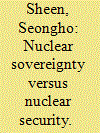

|
|
|
|
|
| Publication |
2011.
|
| Summary/Abstract |
South Korea is the world's sixth-largest nuclear energy producer, with 20 nuclear
power plants providing about 40 percent of its electricity. South Korea's nuclear
energy development has been made possible by the ROK-U.S. Atomic Energy
Agreement signed in 1972. The United States provided nuclear technologies and
materials necessary for the peaceful use of nuclear energy; in return, South Korea
was specifically prohibited from proliferation-related activities such as the reprocessing of spent fuel and uranium enrichment under the terms of the agreement.
After three decades of successful bilateral nuclear cooperation, the two governments are due to renew the accord by 2014. However, negotiations on the new
agreement between Seoul and Washington could potentially provide a source of
tension and controversy. In particular, South Korea's wish for a complete fuel-cycle
capability could directly conflict with President Obama's call for a nuclear weapons
free world and U.S. concerns about nuclear proliferation. The bilateral negotiation
between the United States and the ROK will have important implications for the
global non-proliferation regime and regional security as well. This paper identifies
issues and challenges regarding the renewal of the ROK-U.S. Atomic Energy
Agreement and discusses the associated policy implications for the ROK-U.S.
alliance.
|
|
|
|
|
|
|
|
|
|
|
|
|
|
|
|
| 9 |
ID:
108546


|
|
|
|
|
| Publication |
2011.
|
| Summary/Abstract |
The minerals industry in the Democratic People's Republic of Korea (DPRK) is
responsible for a significant part of North Korea's exports and accounted for 15.2
percent of exports in 2005. The DPRK holds most of the total known minerals
deposits on the Korean peninsula and are estimated to be 30 times more than the
deposits of the Republic of Korea (ROK). The minerals production sector in
North Korea lacks modern equipment and suffers from electricity shortages.
Equipment in many mines is decades old and includes some materials that date
back to the Japanese colonial period. Due to its economic isolation, the DPRK is
unlikely to develop these resources and increase production independently. The
exception is uranium mines in the DPRK that have received significant resources
from the Korean People's Army (KPA). These mines use modern equipment and
transportation facilities, and their workers are accorded special status, receive
preferential access to food, and other bonuses. Given its inability to redevelop the
minerals sector domestically, exploitation of the DPRK's mineral resources
through linkages with South Korean and overseas consumer markets is likely to
be the most profitable way for the DPRK to develop its minerals sector. Chinese
and South Korean firms have the most experience in investing in the mineral sector.
Mineral sector development activities and Korean-Chinese business networks can
be extremely beneficial in building relations with DPRK officials and acting as
intermediaries for investors.
|
|
|
|
|
|
|
|
|
|
|
|
|
|
|
|
|
|
|
|
|